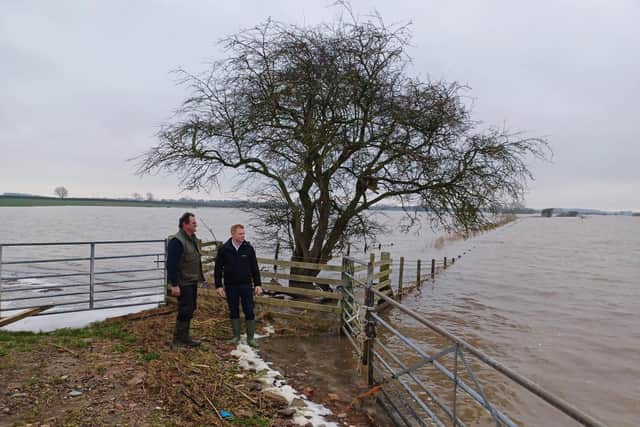Flooding: Impact is taking its toll on farmer mental health in Yorkshire
In recent weeks Robbie Moore, MP for Keighley and also Minister for Rural Affairs, and Graham Stuart, MP for Beverley and Holderness have made separate visits to farmers across East Yorkshire to hear how repeated flooding is affecting them and potential ways forward to find solutions.
The deluge of wet weather from Autumn last year onwards is having an effect on the mental health of farmers as well as the physical effect of dealing with damaged crops and caring for cattle.
Advertisement
Hide AdAdvertisement
Hide AdFlooding has been an issue near the River Hull for decades and hundreds of acres of farmland remain underwater with some farmers surrounded on all sides by the deluge, with homes and businesses cut off from dry land.


Farmer, Nigel Watson, hosted a visit by Mr Moore at Coney Garth Hill Farm in North Frodingham and was joined by fellow farmers Tom Warkup and Mike Artley.
Mr Watson, an arable and livestock farmer, said: “I thought it was good getting him onto farm and showing him the state of play, you can’t beat doing that.
“The one thing you can never explain and actually don’t quite realise is the impact constant flooding has on your health.
Advertisement
Hide AdAdvertisement
Hide Ad“Being surrounded by that amount of water for such a long time is taking its toll on us mentally now.”
He has lost 20 acres of wheat crops and will only know the full extent of the damage once water levels have gone down.
He added: “The cattle are well out of the water as they are housed but herd health remains a top priority.
“We’ve lost about 20 acres of wheat and the rest is grassland that we’re hoping will recover, but we aren’t going to have much spring grass now and we’ll probably have to do re-seeding as well. We will not know the extent of it until the water has gone fully.
Advertisement
Hide AdAdvertisement
Hide Ad“I’m hoping, especially when we get some more hard facts from a more recent survey, that Mr Moore will nudge the Environment Agency in the right direction.
“I’ve every confidence that he’ll do that because he does understand our situation and I think we’ve just got to provide him with some hard facts.”
Meanwhile, Graham Stuart MP, who has campaigned on flooding issues in the region for nearly ten years, met with farmers and members of the Beverley and North Holderness IDB (Internal Drainage Board).
They believe many of the problems are being caused by obstructions in the river that could be dealt with, such as reeds, fallen trees and sunken boats, while banks need to be rebuilt to specification, pinch points dealt with and silt removed.
Advertisement
Hide AdAdvertisement
Hide AdHowever, the Environment Agency’s principal responsibility is to protect people and property, so farmland tends to come down the list of priorities.
Mr Stuart said: “This was a very impressive presentation and gives me hope. It’s probably the best ever demonstration I’ve heard on these issues.
“If the IDB genuinely can pull together the data from the various sources, we really are getting somewhere.
“This has been going on a long time, and we need a properly funded system, doing as it is supposed to do, with the science right behind it. We should be able to do this within the existing system. If so, it will serve everyone, including the rural community and protect food production by preventing flooding.”
Advertisement
Hide AdAdvertisement
Hide AdThe results of the survey should be available within four to six weeks.
'The Country Post newsletter - bringing you all the latest on rural life and farming across Yorkshire. Sign up today www.yorkshirepost.co.uk/newsletter
Comment Guidelines
National World encourages reader discussion on our stories. User feedback, insights and back-and-forth exchanges add a rich layer of context to reporting. Please review our Community Guidelines before commenting.
